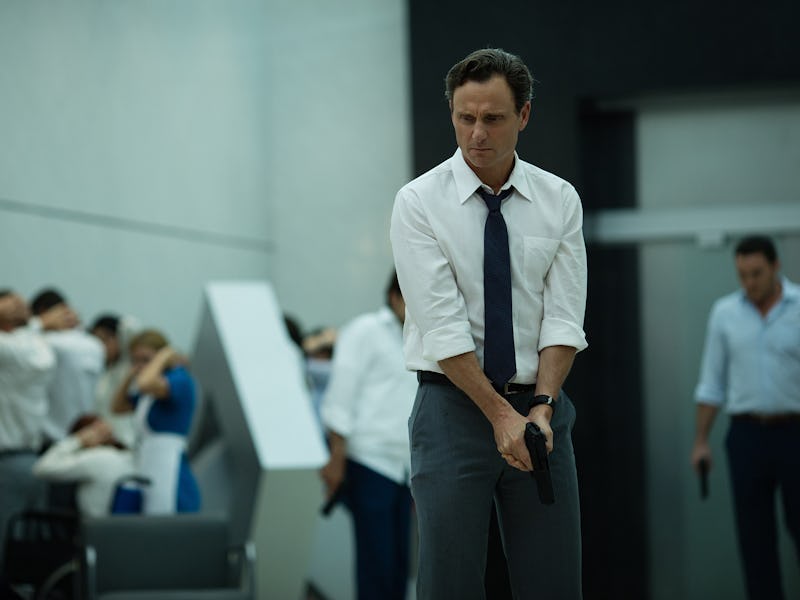'Belko Experiment' Director Says Corporations Will Kill Us All
Don't be fooled by the unusual lighting and sound in 'The Belko Experiment.' The political message is as clear as day.

The promise of work-life balance is often a farce, and in The Belko Experiment, it’s just plain scary.
Belko, the fictional staffing company at the center of director Greg McLean’s new movie, feeds its employees so many perks that they become dangerously compliant. Placated with a company car, around the clock security, and free housing, Belko employees are lulled into accepting a tracking chip placed at the base of their skulls. When the movie, co-written by Guardians of the Galaxy’s James Gunn begins, the company’s employees are told — and believe — that they’ve been chipped for protection from a Colombian drug lord or terrorist attack. The true — and more nefarious — purpose of the chips becomes evident when every window in their drab office slams shut, and a voice tells the entire staff of 80 that they have to kill two of their own or risk being murdered as a group.
McLean says a lot of the horror in his film is supposed to feel familiar. “People high up in corporations are sometimes forced to make these inhumane decisions,” he tells Inverse. “That’s what the first big shooting scene is. It’s layoffs. You’re destroying people’s lives in the name of the company’s bottom line.”
The scene McLean describes sees Belko’s COO (Tony Goldwyn) choose a group of employees to shoot in the back of the head. He’s been instructed by his superiors to kill a certain number of people, or else everyone in the building will die, and his first response is to kill off the oldest employees with no dependents. As he asks employees to get in a line and kneel down, they plead with him, offering up any extraneous information that might save them. Some don’t have kids, but their parents are sick and need their help. The COO shoots them anyway.
To some degree, McLean understands that “difficult decisions,” like laying off a third of your staff, are just part of the corporate process. However, the gleeful violence of characters like Wendell (John C. McGinley) illustrate that some executives at Belko truly enjoy the cutthroat mentality. At the end of the film, both the stonefaced COO and Wendell have blood on their hands, but only Wendell seems to really revel in it. Even before the “experiment” is announced, Wendell harasses women in the office, revealing predatory behavior before Belko truly lets him off-leash. McLean says that’s not accidental, either. “The corporate world is dehumanizing in so many ways,” he says. “Some people become attuned to it.”
The horror film’s protagonist, Mike (John Gallagher Jr.), reacts to Belko’s initial threats by trying to get himself out of the corporate trap. When he attempts to cut the tracking device out of his own skin, he’s told that trying to save himself from the system will effectively kill all his coworkers. Next, Mike and his friends attempt to contact bystanders for help and cut off executive access to the building’s armory, but both plans fail. Later, Mike becomes slightly more comfortable with violence. Mike’s descent is horrific, with blood spurting onto his face and the wall behind him, all while a corporate presentation on Belko’s significance plays cheerily in the background. Images of smiling employees are projected onto Mike’s bug-eyed, desperate face in the heat of the battle.
“[The scene] isn’t quite triumphant,” McLean says, “but him getting to kill as many of the powerful Belko people as he can, that’s ultimately triumphant.” McLean says the film’s production design was tinkered with very carefully in order to signal to the audience which kills are intended to be read as “successful.” McLean says he uses music to cue the audience into reading scenes a certain way.
For instance, the film’s soundtrack during all the killing comprises several well-known American pop songs sung in Spanish. McLean says, “I always wanted pop music playing underneath all the killing, but after some thought, we decided having all the songs in Spanish would add an extra layer of mystery. First of all, it all sounds like it could be coming from the Colombian radio station they’re listening to. Second, I wanted the viewer to be pretty sure they knew what song was playing, but not be so sure to get comfortable.” I Will Survive plays over the film’s sweeping opening, and the bloody descent into chaos that happens just before act three is set to a Spanish cover of California Dreamin’.
The Belko Experiment is currently in theaters.